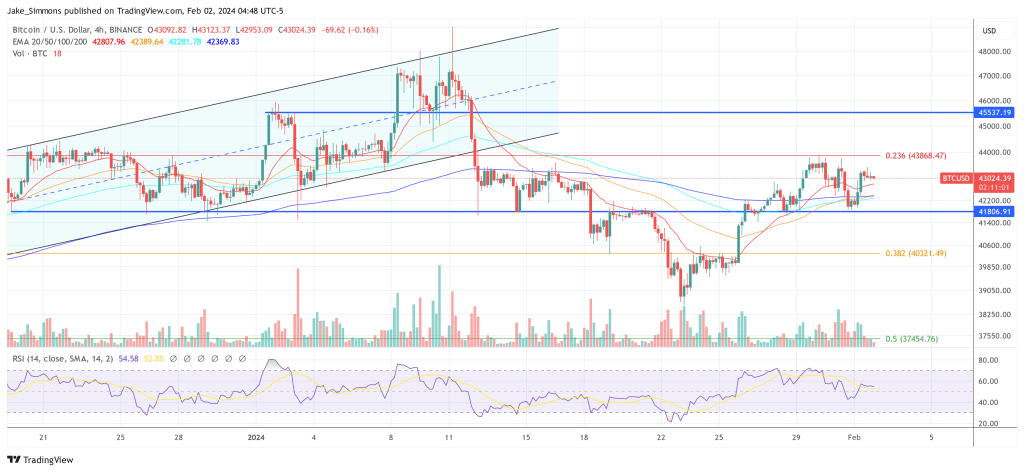ARTICLE AD
North Carolina Representative Wiley Nickel, joined by Senator Cynthia Lummis and Representative Mike Flood, has put forth a Congressional Review Act (CRA) resolution that could be of critical importance to the US Bitcoin and crypto industry. This significant legislative effort aims to overturn the Securities and Exchange Commission’s (SEC) directive requiring banks to include customer cryptocurrency assets on their balance sheets, potentially clearing a major hurdle for the institutional adoption of Bitcoin and other digital assets.
The CRA resolution targets the SEC’s Staff Accounting Bulletin (SAB) 121, issued in March 2022. This controversial bulletin demanded that financial institutions reflect an equivalent liability on their balance sheets for each digital asset held. The digital asset sector widely criticized this requirement for its potential to undermine the operational viability of digital asset custodians.
In late October 2023, the Government Accountability Office (GAO) determined that SAB 121 was required to undergo Congressional review. Following this decision, legislators in both the House and the Senate have initiated formal actions to overturn the rule.
SAB 121 Is Crucial For Institutional Bitcoin Adoption
Perianne Boring, the CEO of the Chamber of Digital Commerce, strongly commented on the issue, emphasizing the importance of this legislative move: “AB 121 has been one of the biggest impediments to institutional adoption of Bitcoin and cryptocurrency. We’re breaking down this barrier to make digital assets more accessible to Americans.”
In a comprehensive statement, the Chamber of Digital Commerce applauded the bipartisan initiative of Senator Lummis, Representative Flood, and Representative Nickel. “Today’s bipartisan resolution represents a decisive action to ensure the SEC operates within its designated rulemaking authority,” the statement read. It further criticized the SEC for bypassing established procedures with SAB 121, thereby “compromising the integrity of the regulatory framework and violating principles of transparent and inclusive governance.”
The SEC’s SAB 121 has been a point of contention within the digital asset community. The Chamber of Digital Commerce’s Token Alliance has been at the forefront of challenging this rule, advocating for its rescission and engaging with various governmental bodies, including the GAO. In their statement, the Chamber highlighted their extensive efforts: “The workstream has submitted eight letters to Congress concerning digital asset custody matters, engaged with the SEC’s Office of the Chief Accountant, and urged the GAO to review the rule.”
The Initiative Has Bi-Partisan Support
Reflecting on the importance of this resolution, US Republican Mike Flood remarked: “Chair Gary Gensler’s SAB 121 has virtually blocked banks from serving as custodians of digital assets. Today, Rep Wiley Nickel, Senator Lummis, and I introduced resolutions to repeal SEC’s terrible bulletin. SAB 121’s days are numbered – it’s time for it to go!”
Patrick McHenry, chairman of the Financial Services GOP, also shared his view, emphasizing the bipartisan nature of the opposition to SAB 121: “There is bipartisan agreement SAB 121 undermines consumer protection and leaves customers’ digital assets vulnerable. I look forward to getting this measure across the finish line to overturn it. Thanks to Mike Flood, Wiley Nickel, and Senator Lummis for your leadership.”
The introduction of the CRA resolution marks a significant moment in the evolving relationship between digital asset markets and regulatory frameworks in the United States. The outcome of this legislative effort has the potential to greatly influence the institutional adoption of Bitcoin and other cryptocurrencies.
At press time, Bitcoin traded at $43,024.
 BTC price needs to break $43,900, 4-hour chart | Source: BTCUSD on TradingView.com
BTC price needs to break $43,900, 4-hour chart | Source: BTCUSD on TradingView.com
Featured image created with DALL·E, chart from TradingView.com

 1 year ago
80
1 year ago
80 

